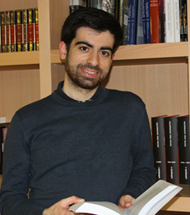A linguist joins ICS to analyze the linguistic-discursive mechanisms that regulate author responsibility in hate and defamatory speeches
D. in Linguistics from the University of Navarra and has experience in centers in Germany, the United Kingdom and Belgium, among others.

PHOTO: Isabel Solana
Dámaso Izquierdo holds an International PhD in Linguistics from the University of Navarra, where he also obtained two master's degrees, and has joined project 'Public discourse' of the Institute for Culture and Society (ICS) of the University of Navarra.
Izquierdo has been researcher visitor at several European institutions, such as the Universities of Lancaster (UK), Heidelberg (Germany), Antwerp (Belgium), and Tartu (Estonia). He has also taught at the latter three centers, as well as at the University of Navarra and the Universidad Nacional a Distancia (UNED).
The researcher has returned to the ICS, the center where he developed his doctoral thesis on evidentiality (2011-2016), after three years researching in European centers. In them he has been able to know "the general panorama of the linguistic research outside Spain," he has assured.
"I have been able to see that the ICS's firm commitment to the interdisciplinary research is still only a dream in many other universities," he said. For this reason, he considered it a "privilege" to be able to work in the environment of partnership between researchers from very different disciplines that the ICS offers.
Responsibility and the speech hateIn his research at the ICS, the linguistics expert will seek to "unravel the linguistic-discursive mechanisms at work in hate and defamatory speeches". As he explained, today's information society allows citizens to easily access and participate in the public forum through the media and social networks. However, "people are often not fully aware of the significance that words can have," he pointed out.
For example, Izquierdo explained that resources such as 'presuntamente', 'por lo visto', 'en principio' or 'según dicen' seem to exempt the author from responsibility although "they only regulate the responsibility of the speaker in different ways, but at no time are they capable of eliminating it completely", he pointed out.
In this way, its analysis will make it possible to identify criteria that will allow a better understanding of "how the responsibility of the speaker is constructed and regulated" and then to transfer them to the context of the hate and defamatory speech . It will thus help to better define the limits between freedom of expression and the violation of the right to honor.
